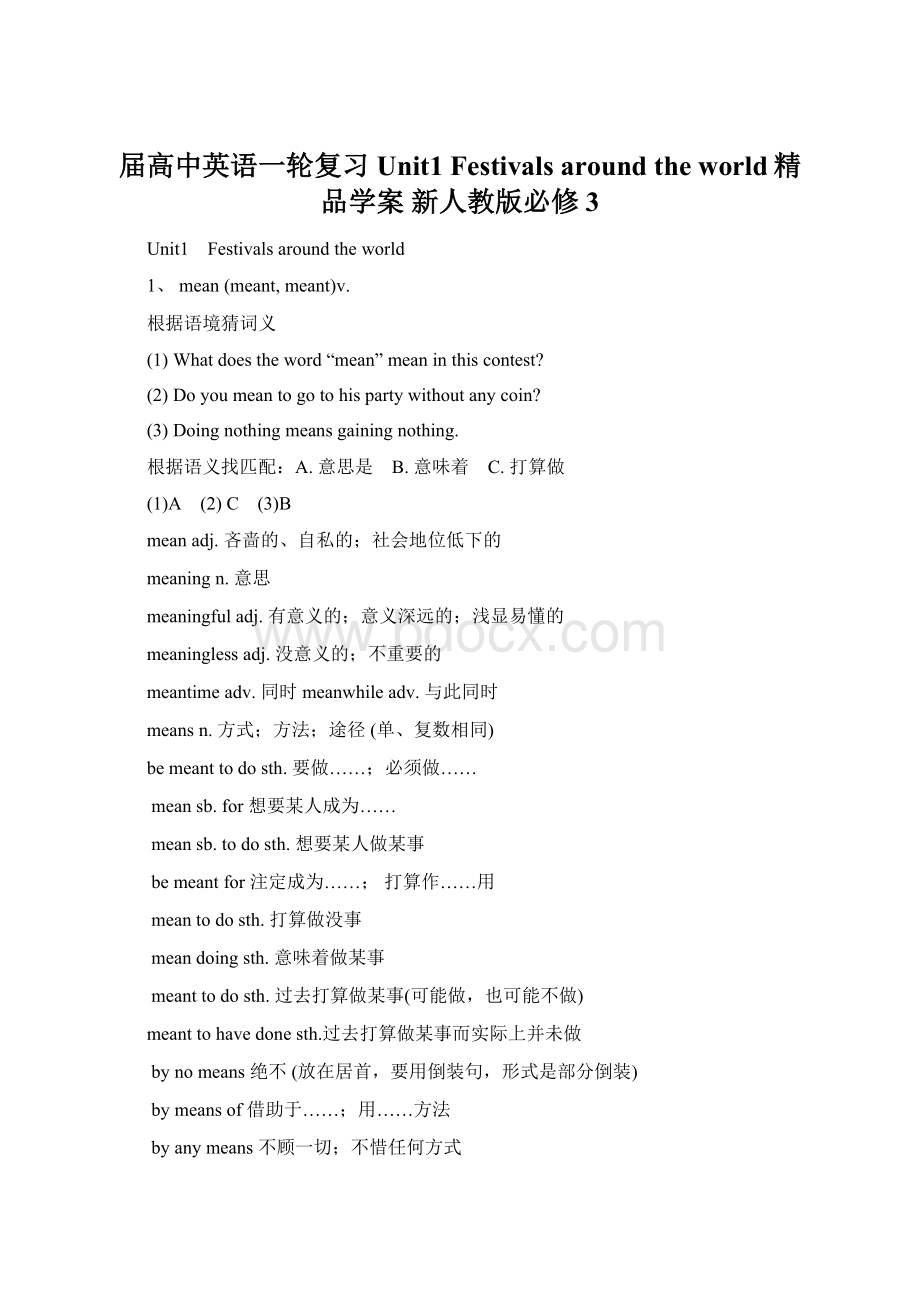届高中英语一轮复习 Unit1 Festivals around the world精品学案 新人教版必修3Word格式.docx
《届高中英语一轮复习 Unit1 Festivals around the world精品学案 新人教版必修3Word格式.docx》由会员分享,可在线阅读,更多相关《届高中英语一轮复习 Unit1 Festivals around the world精品学案 新人教版必修3Word格式.docx(15页珍藏版)》请在冰豆网上搜索。

byanymeans不顾一切;
不惜任何方式
byallmeans用尽一切办法
meannothingto…对……毫无意义(兴趣)
单项填空
( )—Didyougotoherbirthdayparty?
—I______,butIhadtoworkextrahourstofinishmyhomework.
A.wouldB.meanttoC.didD.wouldliketo
B 本题考查的是虚拟语气在具体语言环境中的运用。
通过题干语义所体现的是对过去所发生的事情的虚拟表达,按常规它应该使用wouldhavedonesth.表示“过去该做的事情而实际上并未做到”。
答案A应该是wouldhave才对,但它并不是。
meantto则有着这一用法,所以答案是B。
2、satisfyv.
(1)Wewilldoeverythingwecantosatisfyeverystudent.
(2)Youcan'
tapplyforthejobunlesssatisfyingallconditions.
A.满足 B.使……满意
(1)B
(2)A
satisfiedadj.满意的;
满足的
satisfyingadj.令人满意(满足)的;
圆满的
satisfactoryadj.令人满意(满足)的;
besatisfiedwith对……感到满意
( )Her______performancemademe______,sotherewas______expressiononmyface.
A.satisfying;
satisfied;
satisfied
B.satisfied;
satisfied
C.satisfied;
satisfying;
satisfying
D.satisfying;
satisfying
A 本题考查的是“情感反应”动词的�ing与�ed作为形容词的语义区别。
本句的语义是:
她那令人满意的表演使我感到满意,于是我的脸上就露出满意的笑容。
第一个空所表达的是“令人满意的”;
第二、三个空所表达的是“满意的”,所以答案是A。
(1)satisfy是一种“情感反应”的动词。
凡是这一类的动词,其�ed和�ing形式都可以用作形容词,它们在句中的作用基本相同,它们的区别一般可以通过语义加以辨别:
①“令人……;
令人感到……”用�ing形式;
②“感到……”或表示该词的本义时,用�ed形式;
③由于自身情感活动而流露出的感情、表情或神色,用�ed形式;
④在toone'
s+n.结构中,一定用其相应的名词形式;
(2)satisfying一般用作定语;
satisfactory一般用作表语。
3、gainv.&
n.
(1)Hehasgainedalotfromhisteachers.
(2)Hegainedagreatdealintheforeigntrade.
(3)Solongasyouworkhard,youwillgainwhatyouexpectto.Asthesayinggoes,nopains,nogains.
A.收益;
利益 B.赚得 C.获得
(1)C
(2)B (3)A
( )______privatehospitalsareoperatingpurelyfor______,howcanwebesuretheytreatthepatientbest?
A.While;
honorB.Once;
service
C.If;
gainD.Though;
income
C 本题考查的是连词的使用以及名词的辨析。
通过语境,我们体会出本题的语义是:
如果私立医院只是为赚钱而开设的,那我们怎能相信他们会更好地善待病人呢?
它所体现出的逻辑关系的是条件,第二个空是“获利”的意思,所以答案是C。
4、gatherv.
(1)Wearetogatherattheschoolgateat7:
30tomorrowmorning.
(2)Darkcloudsisgatheringandthenorthwindiswhistlingwhichpromisethatastormisdrawingnear.
A.集合,聚集 B.积聚
(1)A
(2)B
gather/collect
gather一般强调同一种事物由少积多的收集。
Weshouldpayattentiontogatheringmaterialsforourcompositioninreading.
collect强调为了某种目的而有选择地、有计划地、认真地“收集”。
Myhobbyiscollectingstamps.
用gather/collect填空
(1)ItwaslateAugustandtheharvesthadbeenwellgathered(收获)in.
(2)Theteachersgathered(聚集)allthestudentsintheplaygroundduringtheearthquake.
(1)gathered 本题的语义是:
这已是晚秋,庄稼已被妥善地收起来。
由于该单词用在被动语态中,表示“收获”之意,所以答案为gathered。
(2)gathered本句的语义是:
在地震期间,老师们把所有的学生都聚集在操场上。
又由于陈述的是过去发生的事情,因此答案为gathered。
5、awardn.
(1)Hegotthefirstawardinsavingthefloodedpeople.
(2)Heisawardedagoldmedalforworkinginthefieldofeducationforsixtyyears.
A.授予……的奖 B.奖励;
奖品
(1)B
(2)A
完成句子
HehasbeengivenEducationalDevelopment______(奖)in2008duetothecontributiontoeducation.
Award 本题的语义是:
由于他对教育的贡献,他被授予2008年度“教育发展奖”。
强调的是“奖励的名称”,由于是专有名词,所以答案是Award。
作为动词,我们要特别注意它们的句式搭配:
awardsb.sth.奖赏某人某物
rewardsb.forsth.因……奖赏某人
rewardsb.withsth.用某物酬劳某人
6、admirev.
(1)It'
sthecustomforChinesetoadmirethemoononMid�autumnDay.
(2)Iadmirehimforhissuccess.
A.钦佩;
羡慕 B.赞美;
欣赏
(1)B
(2)A
admirationn.钦佩;
赞美;
羡慕
admirern.赞美者;
爱慕者;
崇拜者
admiringadj.佩服的,称赞的
admirableadj.值得称赞的;
可叹为观止的
admiresb.for…因某事佩服某人的……
( )
(1)Moreyoungpeoplecontinuedtomaketheirwayupthemountainto______thebrightlyshiningmoon.
A.followB.showC.noticeD.admire
D 此处admire指“欣赏”,follow“跟随”;
show“展示”;
notice“无意中发现”均与题意不符,所以答案是D。
(2)Facedwiththedangeroussituation,herushedintotheburninghousetorescuethechild.Iadmirehimforhiscourage(佩服他的勇气).
7、funn.&
adj.
(1)Heisfulloffun.
(2)Wehadalotoffunattheparty.
(3)It'
sgreatfunworkingwithhim.
根据语义找匹配
A.娱乐;
乐趣 B.有趣的事或人 C.嬉戏;
玩笑
(1)C
(2)A (3)B
funnyadj.可笑的;
滑稽的;
古怪的
for/infun闹着玩地;
不当真地
makefunof取笑……;
拿(某人)开玩笑
havefun玩得开心;
玩得愉快;
(祝福语)祝你玩得开心。
( )______itistohaveabreakbetweenclasses!
A.WhatagreatfunB.Whatgreatfun
C.HowfunD.Howfunny
B 本题考查的是:
fun与funny区分和fun作为名词前的冠词问题。
通过语境语义反映出的是“课间能稍事休息是一件多么惬意的事情啊!
”而不是“滑稽可笑的”,作为名词其前一般是不加冠词的,所以答案是B。
fun在中学阶段是一个不带冠词的名词,而我们的考试往往会考其前的冠词问题,所以遇到此类问题时,一般地我们就选不带冠词的选项。
当然我们还要通过语境语义正确的使用形容词funny。
8、honourn.&
v.
(1)Wefightforthehonourofourcountry.
(2)Weshouldshowrespecttoeverystudent,becausetheyhaveafinesenseofhonour.
sagreathonourtohavebeenaskedheretomakeaspeechtoyouall.
A.荣幸的事、荣耀的事 B.荣誉 C.自尊心
(1)B
(2)C (3)A
inhonourof为了纪念……;
为了向……表示敬意
onone‘shonour以荣誉作为担保
dothehonours尽地主之谊
havethehonourtodosth.有幸做某事
behonouredas…被尊称为……
Willyouhonourmewithavisit?
如蒙光临,十分荣幸。
/可否请您光临?
It'
sagreathonourtodosth.做……倍感荣幸
( )
(1)Thereisapartytonight______ournewEnglishteacher,Tom.
A.inmemoryofB.inplaceof
C.inhonourofD.infavorof
C 考查名词词组的辨析。
inmemoryof为了纪念……(一般用于对已故的人);
inplaceof代替;
inhonourof为了向某人表示敬意;
infavorof同意。
根据语境:
举办聚会是向新老师表示敬意,所以答案是C。
( )
(2)It'
s______greathonourforustofightfor______honourofourcountry.
A.a;
/B.a;
theC./;
theD.a;
a
B 考查冠词的用法。
honour在此是抽象名词具体化,表示“一件非常荣幸的事”,用不定冠词。
在表示“荣誉”时,honour是可数名词,因指国家荣誉,是特指,所以用定冠词,故答案是B。
9、remindv.
Thefilm
(1)remindedmeofmychildhood,whichalways
(2)remindsmetoworkhard.
A.使某人想起了 B.提醒
(1)A
(2)B
remindsb.ofsth.使某人想起了……
remindsb.todosth.提醒某人做某事
remindsb.that…提醒某人……
( )
(1)Inourchildhood,wewereoften______byGrandmatopayattentiontoourtablemanners.
A.demandedB.reminded
C.allowedD.hoped
B 句意:
在我们童年时代,奶奶经常提醒我们要注意吃饭礼仪。
一般地,当题干部分是被动语态时,我们最好先用还原法把被动语态中的主语还原到其宾语位置上,然后在寻求动词在句中的搭配关系,这样我们就能把demand和hope排除,因为这两个动词都不能用demand/hopesb.todosth.表达;
再通过语境语义,我们可以体会出是经常“提醒”的意思,所以答案是B。
(2)他的话使我想起昨天发生的一件事。
Whathesaidremindedmeofathingthathappenedyesterday.
(3)他足不出户便知天下事。
Hestaysindoors,remindedof/knowneverythingintheworld.
(1)在使用“使某人想起了……”这一句式,中国学生特别会受到汉语的影响而使用汉语式的表达makesb.thinkof,这是错误的,因此我们在使用过程中,务必注意这一点。
(2)常用“动词+sb.+of+名词”句型的还有:
warn/accuse/cure/suspect/rob+sb.+of
10、takeplace
(1)Whoknowswhentheopeningceremonyofthenewtermwilltake_place?
(2)Greatchangeshavetaken_placeinourschoolaftermanyyearsofhardwork.
A.发生 B.举行
(1)B
(2)A
taketheplaceof代替takeone'
splace代替某人;
坐下
inplaceof代替inplace放在原来的位置;
原地
inone'
splace
处于某人的位置;
为某人设身处地地想想
outofplace不合适;
不恰当;
格格不入
giveplaceto让位于……
takeplace/happen/occur/comeabout/breakout
takeplace的“发生、举行”大都侧重于安排或按计划所发生的事情。
ASuperBoyconcertwilltakeplaceinthesquaretonight.
happen侧重于“偶发”,不可预料的事情的“发生”。
这时可与occur互换。
happentodosth.或ithappenedthat…表示“碰巧做某事”时不能与occur互换。
Iwascrossingthestreetwhenatrafficaccidenthappened.
IthappenedthatIwasn'
ttherewhentheearthquakehappened.
occur比较正式,所指的事件和时间比较明确。
occurtosb.“某人突然想起某事”,这时不能用happen代替。
Canyoutellmewhenonearththeaccidentoccurred?
Itoccurstomethatwestillhavealotofthingstodo.
comeabout常指偶然发生的事情,且很多时候与how连用。
Howdiditcomeaboutthatheleftschool?
breakout常指“战争、疫病或火灾”的突然发生。
EV71brokeoutinChinainthespringof2008.
( )
(1)Suddenlyit______tomethatweshoulddowhatwecouldtocollectmoneyforthepoorcollegestudents.
A.happenedB.tookplace
C.occurredD.cameabout
C 本题考查的是关于“发生”意义的词的区别。
通过题干所表现出的语义是“计上心头”之意,所以答案是C。
( )
(2)It______thatIwasoutwhenhecametoseeme.
A 本题考查的是关于“发生”意义的词的区别。
通过题干所表现出的语义是“碰巧”之意,所以答案是A。
用happen/occur/comeabout/takeplace的正确形式完成句子
(3)Didn'
titoccurtoyoutophonethemaboutit?
(4)In1919,theMay4thMovementtookplace inChina.
(5)I'
llneverunderstandhowitcomeabout thatyouwerelateforthemeeting.
(6)Anaccidenthappenedtohimyesterday.
11、lookforwardto
(1)I'
mlooking_forward_toyourreplysoon.
(2)It'
stimeforustolookbackandlook_forward.
A.盼望;
期盼 B.展望
lookat看着lookabout/around环顾……;
向四周看
lookafter照顾;
照料lookahead考虑未来
lookback(vi.)朝后看;
回顾;
回想
lookbackon(vt.)回顾
lookdown(vi.)向下看;
俯视;
鸟瞰
lookdownon/upon看不起;
蔑视
lookfor寻找lookinto调查
looklike看起来像……lookon袖手旁观
lookon…as…把……看做……
lookout向外看;
(警告用语)当心
lookover检查;
检阅
lookthrough向里看;
浏览;
快速查看
lookup向上看;
仰望;
抬头看
lookupat抬头看见……lookupto尊敬
lookforwardto的to是介词,当其后接动词时要用其�ing形式。
介词to构成的常用短语还有:
payattentionto注意getdownto着手做;
开始做
objectto反对devoteoneself/one'
slifeto致力于
contributeone‘slifeto献身于beusedto习惯做
leadto导致做setto开始做
(1)Don'
tworry.Wearelookinginto(调查)thecase.Inthenearfuture,we'
lltellyouthetruth.
(2)Whenhelookedup(抬头看),hefoundhisteacherstandinginfrontofhim.
( )(3)Noonelikes______.
A.lookingdownuponB.beinglookeddownupon
C.beinglookeddownD.tobelookeddown
B 考查动词短语的搭配。
“看不起”的动词短语搭配是lookd